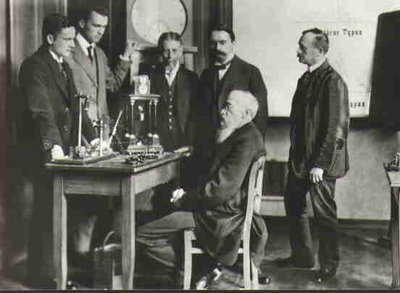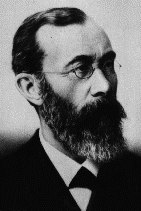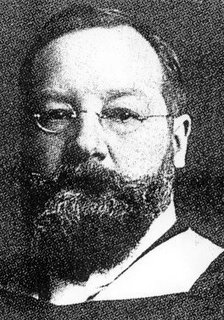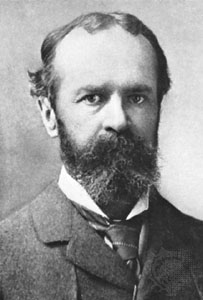
Wilhelm Wundt Surrounded by Colleagues in His Laboratory of Experimental Psychology
from the left: Friedrich Sander, Otto Klemm, Dittrich, Wilhelm Wirt, Wilhelm Wundt (sitting) and Hartmann, his assistant
Laboratory Psychology
Is psychophysics part of psychology or part of physics? Until the late nineteenth century, most "psychological" research was really focused on medicine, physiology, or physics rather than on psychological processes. This changed, however, as a body of work emerged that was distinctive of psychology -- behaviour and mental processes -- rather than the domain of other disciplines. The "birthdate" usually assigned to this demarcation of psychological resarch is 1879, because it was in that year that the first scientific laboratory for psychological research was established.
Structuralism
In 1879 W
 ilhelm Wundt(1832-1920), a German professor of philosophy, founded the first laboratory for the scientific study of psychology at the University of Leipzig. Unlike his predecessors in psychophysics, Wundt was interested in decidedly psychological processes like consciousness, thought and emotions. The "laboratory" Wundt established consisted of a group of people interested in these same phenomena, all of whom intended to study these processes scientifically.
ilhelm Wundt(1832-1920), a German professor of philosophy, founded the first laboratory for the scientific study of psychology at the University of Leipzig. Unlike his predecessors in psychophysics, Wundt was interested in decidedly psychological processes like consciousness, thought and emotions. The "laboratory" Wundt established consisted of a group of people interested in these same phenomena, all of whom intended to study these processes scientifically.The "scientific" technique Wundt employed was introspection, literally a "looking within", the common practice of considering one's own actions and reactions and self-consciously trying to analyze their sequence and components. For example, in order to understand the tactile sensation of "wetness" Wundt would ask a subject to immerse his hands in water, and describe his various sensations separately. "Wetness" might equal a combination of the tactile sensations of "coolness" plus "smoothness". Wundt hoped thus to identify the basic components of more complex conscious experiences.

Wundt's work was extended in the United States by his studentEdward Bradford Titchener(1867-1927), who emphasized the study of sensations as the building blocks of the content of consciousness, without concern for the processes of goals of consciousness. Because Titchener's and Wundt's school of thought came to be known as structuralism. Structuralist assumptions are very common. They can be seen in action when a child tries to understand a new toy by taking it apart, or when an adult enjoys a meal and inquires about the ingredients. The structuralist perspective assumes that psycholoical experience is better understood only when the content of that experience has been analyzed and identified.
Functionalism
A very diffe
 rent point of view was espoused by William James(1842-1910), whose 1890 book Principles Of Pscyhology is considered the first text in psychology. James himself is usually referred to as the father or founder of American psychology. Trained as a physician, James was a professor of physiology, psyhcology and philosophy at Harvard. His interests in psychology were broad and his influence on the new discipline enormous.
rent point of view was espoused by William James(1842-1910), whose 1890 book Principles Of Pscyhology is considered the first text in psychology. James himself is usually referred to as the father or founder of American psychology. Trained as a physician, James was a professor of physiology, psyhcology and philosophy at Harvard. His interests in psychology were broad and his influence on the new discipline enormous.James favoured a school of psychology termed funcitonalism. A functionalist perspective assumes that the products of psychological processes -- behaviour, emotions and thoughts -- must serve some function, or they would be changed or lost. The way to understand psychological processes, therefore is not to analyze their struccture, but rather to identify their goals. Whereas a structuralist looks at a behaviour and asks," What are the components of that behaviour?" a functionalist asks,"What purpose does that behaviour serve?"
Functionalist assumptions emerge whenever researchers question the usefulness or origins of a cross-cultural behaviour pattern. For example, why do people in all parts of the world smile when they are happy? Because smiling is universal, it is probably built-in rather than acquired through learning. The functionalist question is: What puropose does smiling serve? Smiling must be useful, it must increase the chances of the smilers' survival. It must have at least one important survival function.
No comments:
Post a Comment